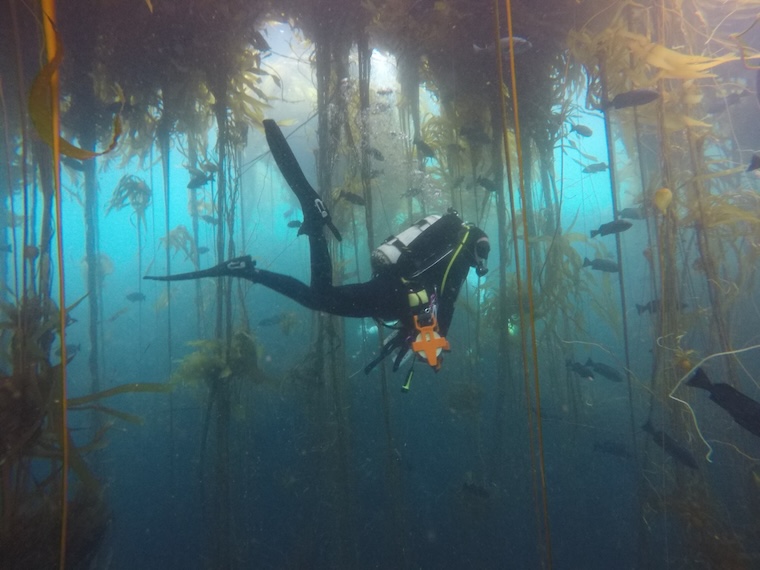Campus News
UC Santa Cruz, Monterey Bay Aquarium lead collaboration on kelp conservation
In May 2024, UC Santa Cruz and the Monterey Bay Aquarium convened a workshop aimed at bridging the gap between scientific research and the practical application of evolutionary resilience concepts for kelp.

DCIM108GOPROGOPR2360.JPG
How can California’s kelp forests, which have faced dramatic declines due to climate change, persist and thrive in the future?
The stakes could not be higher. Giant kelp, the foundation of coastal ecosystems from Mexico to Alaska and across the globe, is one of the most productive plants on Earth. These underwater forests act as nurseries for thousands of marine species, including commercially important ones like abalone and rockfish. Beyond their ecological value, kelp forests contribute an estimated $500 billion annually to the global economy, serving as a key ingredient in products ranging from toothpaste and pharmaceuticals to salad dressings.
In May 2024, UC Santa Cruz and the Monterey Bay Aquarium convened a workshop aimed at bridging the gap between scientific research and the practical application of evolutionary resilience concepts for kelp. Co-led by Malin Pinsky, associate professor of ecology and evolutionary biology, and April Ridlon, director of science for U.S. and California ocean conservation at the Monterey Bay Aquarium, the workshop convened experts and practitioners from organizations including ReefCheck, Monterey Bay National Marine Sanctuary, and California Department of Fish and Wildlife.
These organizations joined The Nature Conservancy as part of the steering committee for this ongoing research initiative, known as KelpEvol, which works to integrate evolutionary resilience into kelp conservation and management strategies. The workshop explored the role of evolutionary resilience in kelp conservation, emphasizing the need to integrate genomic science into management strategies.
Evolution, often overlooked in restoration efforts, is a key mechanism that can facilitate kelp persistence and recovery. The workshop’s findings, published in a September 2024 report on the research repository FigShare, highlight critical priorities:
- Maintaining evolutionary options: Strategies that preserve genomic diversity and foster locally adapted populations are more likely to sustain abundant kelp ecosystems.
- Genomic tools for management: Incorporating genomic data into spatial planning, restoration broodstock selection, and management-outcome assessments can bolster conservation efforts.
- Key priorities for action: These include spatial mapping of kelp-genomic diversity, monitoring restoration sites, trialing restoration with diverse source populations, biobanking kelp diversity, and engaging the public in discussions about evolutionary resilience.
California currently lacks a formal management plan for giant kelp, but discussions are underway to draft one, with an expected rollout beginning in 2027. The findings from this workshop aim to shape the development of the state’s Kelp Restoration and Management Plan (KRMP), providing actionable insights for policymakers.
“Evolutionary resilience offers a path forward for restoring and maintaining kelp ecosystems in the face of climate change,” Pinsky said. “By harnessing genomic science, we can better understand which kelp populations may be pre-adapted to future conditions and ensure their persistence.”

The workshop was supported by the UC Santa Cruz Center for Coastal Climate Resilience, which is dedicated to advancing nature-based solutions to address the climate challenges facing California’s coast. Established in 2022, the center has funded over 40 projects and supported more than 35 research fellows in just two years.
Giant kelp forests, once thriving along California’s coastline, are now under significant threat from warming waters, overgrazing by sea urchins, and other stressors. By prioritizing evolutionary resilience and genomic research, scientists and policymakers hope to create a sustainable path for kelp conservation.
As California moves toward implementing its first kelp management plan, the findings from this workshop offer a hopeful vision for protecting these vital marine ecosystems for generations to come.
“As California faces escalating climate-driven hazards, it’s critical to find actionable solutions that integrate science and policy,” Ridlon said. “This workshop demonstrates how collaboration can drive progress for coastal ecosystems like kelp forests.”
Pinsky’s next research project, in partnership with UC Santa Barbara, will focus on whole-genome sequencing of historical kelp collections. This research will deepen understanding of the kelp genome and its capacity for evolutionary resilience, complementing other cutting-edge DNA engineering efforts at the UC Santa Cruz Genomics Institute, part of the Baskin School of Engineering.